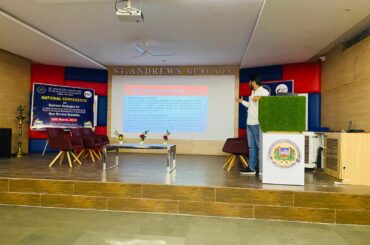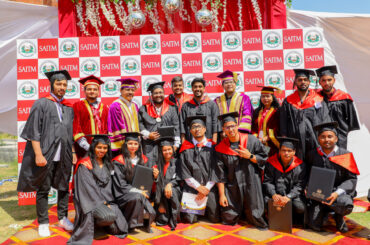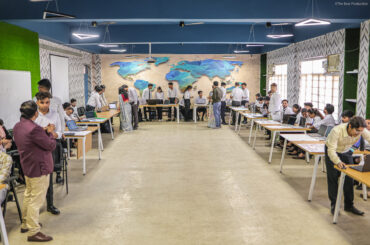B Tech Fees
Investing in engineering courses like B.E. or B.Tech can profoundly influence one’s future. B Tech fees can differ greatly, influenced by the type of institution (government or private), the chosen specialization, and the location of the institution.
Here’s an overview of the key components of B.Tech fees:
Tuition Fees
Government Colleges: Typically lower tuition fees due to subsidies and government funding.
Private Colleges: Generally higher tuition fees, which can vary based on the college’s reputation and facilities.
Admission Fees
One-time fee charged during the admission process, which includes application fees, registration fees, and other miscellaneous charges.
Examination Fees
Fees charged for semester exams, which can vary based on the number of subjects and the institution’s policies.
Laboratory and Library Fees
Additional fees for access to laboratory equipment, library resources, and other academic facilities.
Hostel and Accommodation Fees
Fees for students opting for on-campus or off-campus accommodation, which include rent, mess charges, and maintenance fees.
Miscellaneous Fees
Includes charges for extracurricular activities, sports, transportation, and other facilities provided by the institution.
Scholarships and Financial Aid;
Many institutions offer scholarships and financial aid based on merit, need, or specific criteria set by the institution or government bodies.
Some of the most opted courses in India and St. Andrews college or different Engineering college or Management colleges are as follows:-
- Btech
- Btech CSE
- Btech ETCE
- MTech
- BCA
- BBA
- MBA
- MCA
- DPharma – St. Andrews College of Pharmacy
- BPharma – St. Andrews College of Pharmacy
- BArch – St. Andrews College of Architecture
Overview of BTech Courses

A Bachelor of Technology (BTech) degree is an undergraduate academic degree conferred after the completion of a four-year program of studies at an accredited university or accredited university-level institution.
This degree equips students with a solid understanding of engineering principles and industrial practices, preparing them for diverse engineering roles in industries or further studies, all within the context of managing B Tech fees effectively.
Key Aspects of BTech degree:
Duration and Structure of BTech degree
The B.Tech program typically spans four years, divided into eight semesters.
The curriculum combines theoretical knowledge with practical applications.
Includes core courses, elective courses, lab work, projects, internships, and industrial training.
Specializations in BTech Courses
Computer Science and Engineering (CSE)
Information Technology (IT)
Electronics and Communication Engineering (ECE)
Electrical Engineering (EE)
Mechanical Engineering (ME)
Civil Engineering (CE)
Chemical Engineering (ChE)
Aeronautical Engineering
Biotechnology
Artificial Intelligence (AI)
Data Science
Eligibility Criteria for BTech Courses
Successful completion of 10+2 or equivalent with Physics, Chemistry, and Mathematics (PCM) as core subjects.
Minimum aggregate marks as specified by the institution (typically around 50-60%).
Performance in entrance exams like JEE Main, JEE Advanced, state-level exams (e.g., MHT CET, WBJEE), or institution-specific exams.
Admission Process in Engineering Courses
Entrance Exams: National level (e.g., JEE Main, JEE Advanced), state level (e.g., MHT CET, WBJEE), or university-specific exams.
Counseling and seat allocation based on entrance exam ranks and scores.
Document verification and fee payment to confirm admission.
Curriculum and Subjects in BTech Courses
First Year: Basic sciences (Physics, Chemistry, Mathematics), introductory engineering courses, and humanities.
Second and Third Year: Core engineering subjects specific to the chosen specialization, lab work, minor projects.
Final Year: Elective courses, major project work, industrial training/internships.
Skills Developed in Engineering Courses
Analytical and problem-solving skills.
Technical proficiency in the chosen field.
Communication and teamwork abilities.
Project management and leadership skills.
Adaptability to technological advancements and industry trends.
Career Opportunities after Engineering Courses
Industries: IT, manufacturing, automotive, aerospace, construction, electronics, telecommunications, biotechnology, etc.
Roles: Software Developer, Mechanical Engineer, Civil Engineer, Electrical Engineer, Data Scientist, AI Specialist, etc.
Further Studies: M.Tech, MBA, MS, Ph.D., or certifications in specialized fields.
Top B.Tech Colleges in India
Indian Institutes of Technology (IITs): Renowned for their high academic standards and excellent placement records.
National Institutes of Technology (NITs): Known for their quality education and strong industry connections.
Indian Institutes of Information Technology (IIITs): Specialize in IT and related fields.
Top Private Colleges: Birla Institute of Technology and Science (BITS), St. Andrews Institute of Technology and Management (SAITM), Vellore Institute of Technology (VIT), and others.
Top Government Colleges: Delhi Technological University (DTU), Netaji Subhas University of Technology (NSUT), College of Engineering, Pune (COEP), etc.
Fees and Financial Aid in BTech Courses
Fees vary widely between government and private institutions.
Scholarships and financial aid options are available based on merit, need, or specific criteria.
Factors Affecting B Tech Fee Structure
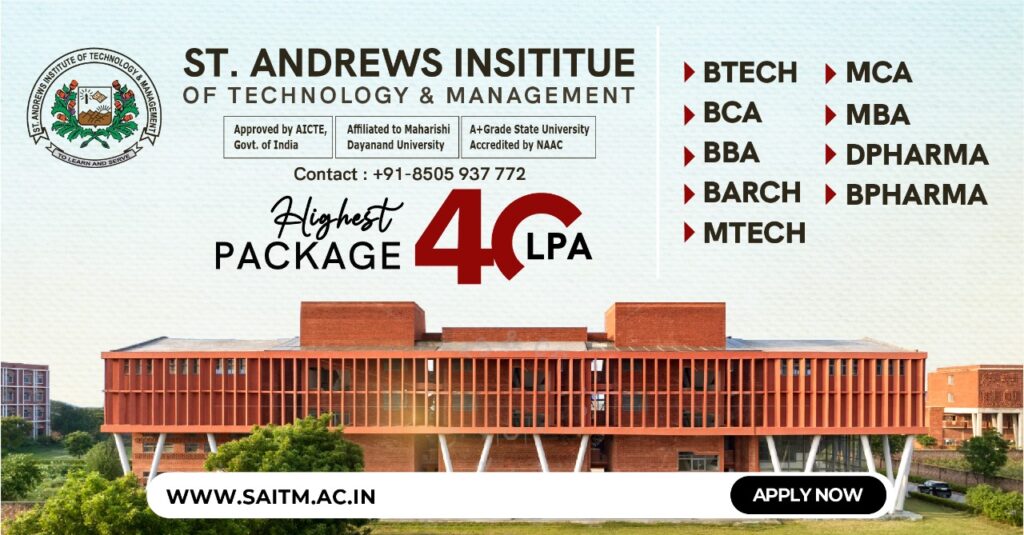
The fee structure for a BTech program can be influenced by several factors:
Institution Type
The type of institution (government, private, or deemed-to-be university) often impacts the fee structure. Government institutions typically have lower fees compared to private institutions.
Location
The location of the institution can affect fees. Institutions in metropolitan areas or regions with a higher cost of living often have higher fees compared to those in smaller towns or rural areas.
Reputation and Ranking
Established institutions with high rankings and a strong reputation may charge higher fees due to their perceived value and quality of education.
Course Specialization
Fees can vary depending on the specialization within the BTech program. Specialized courses or those with additional resources and facilities may have higher fees.
Infrastructure and Facilities
Institutions with state-of-the-art infrastructure, modern laboratories, and additional facilities (such as hostels, libraries, and sports complexes) may have higher fees to cover these amenities.
Faculty Expertise
Institutions that employ highly qualified and experienced faculty may charge higher fees to reflect the quality of education and expertise provided.
Government Policies
Fee structures can be influenced by government regulations and policies. Subsidies or fee caps imposed by state or central governments can impact the overall fee structure.
Scholarships and Financial Aid:
Availability of scholarships, financial aid, or fee waivers can affect the net fee paid by students, even if the initial fee structure is high.
Duration and Structure of the Program
The length and structure of the BTech program can impact fees. Programs with additional semesters, internships, or international exchange opportunities might have a different fee structure.
Additional Costs
Other costs, such as lab fees, exam fees, library fees, and charges for extracurricular activities, can also affect the total fee structure.
Inflation and Economic Factors
General inflation and economic conditions can influence fee adjustments over time, leading to changes in the fee structure from year to year.
Detailed Breakdown of BTech Fees

Here’s a detailed breakdown of BTech fees:
Tuition Fees
Annual Tuition Fee: B Tech fees, which are the core charges levied by institutions for educational services, vary widely depending on the college’s reputation, location, and specialization.
Example: ₹1,00,000 to ₹3,00,000 per year.
Admission Fees
One-time Fee: Charged during the initial enrollment for processing and confirming admission.
Example: ₹10,000 to ₹50,000.
Examination Fees
Per Semester/Annual Fee: Fees associated with conducting exams, evaluation, and certification.
Example: ₹5,000 to ₹15,000 per semester.
Library Fees
Annual Fee: For access to library resources including books, journals, and digital materials.
Example: ₹2,000 to ₹5,000 per year.
Laboratory Fees
Annual/Semester Fee: Applicable for usage and maintenance of laboratory facilities, especially in technical and engineering courses.
Example: ₹5,000 to ₹15,000 per semester.
Development Fees
Annual Fee: Charged for infrastructure development and maintenance.
Example: ₹10,000 to ₹30,000 per year.
Hostel Fees (if applicable)
Annual Fee: Covers accommodation and basic amenities.
Example: ₹50,000 to ₹1,00,000 per year.
Mess Charges (if applicable)
Monthly Fee: Covers the cost of meals provided in the hostel.
Example: ₹3,000 to ₹5,000 per month.
Transportation Fees (if applicable)
Annual/Semester Fee: For students opting for college transportation.
Example: ₹10,000 to ₹25,000 per year.
Miscellaneous Fees
Various Charges: Includes sports, cultural activities, medical facilities, etc.
Example: ₹5,000 to ₹10,000 per year.
Security Deposit (Refundable)
One-time Fee: Charged at the time of admission, refundable upon course completion.
Example: ₹5,000 to ₹20,000.
B Tech Eligibility Criteria
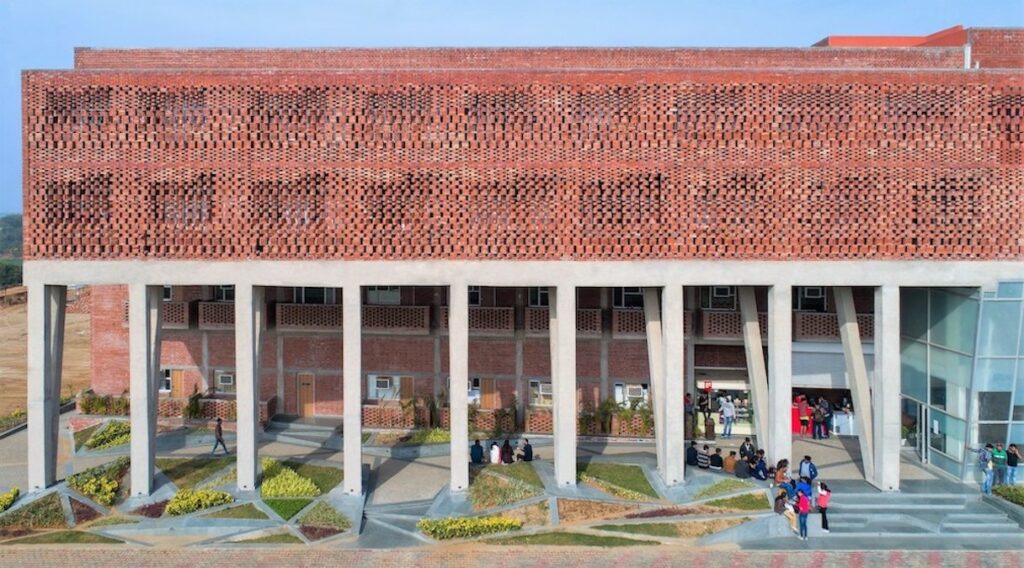
To pursue a Bachelor of Technology (B.Tech) degree and manage B Tech fees effectively, candidates must meet specific eligibility criteria, which may vary slightly by institution and country.
Here’s a comprehensive overview of the general eligibility criteria for B.Tech programs:
Educational Qualification
10+2 or Equivalent: Candidates must have completed their higher secondary education (10+2) or equivalent from a recognized board.
Required Subjects: Physics, Chemistry, and Mathematics (PCM) are mandatory subjects. Some institutions also consider marks in English.
Minimum Marks Requirement
Candidates must secure a minimum percentage of marks in their 10+2 examinations, usually ranging from 50% to 60%. This requirement can vary by institution and category (general, SC/ST/OBC, etc.).
Entrance Examinations
National Level Exams: JEE Main and JEE Advanced are the most common entrance exams for admission to B.Tech programs in prestigious institutions like IITs, NITs, and IIITs.
State Level Exams: Several states host their unique entrance exams, including MHT CET in Maharashtra, WBJEE in West Bengal, and KCET in Karnataka.
Institution-Specific Exams: Some universities and private engineering colleges conduct their own entrance exams, like BITSAT (BITS Pilani), VITEEE (VIT University), SRMJEEE (SRM University), etc.
Age Limit
Generally, candidates must be at least 17 years old at the time of admission. The upper age limit may vary depending on the institution and category.
Nationality
Candidates must be citizens of the country where they are applying. For example, for Indian institutions, candidates must be Indian nationals or OCI/PIO cardholders.
Additional Requirements
Domicile Requirements: Some state-level institutions have domicile requirements, meaning candidates must be residents of the state or have studied there for a certain number of years.
Medical Fitness: Some institutions may require a medical fitness certificate to ensure that the candidate is physically fit to pursue the engineering course.
Reserved Categories
Candidates belonging to reserved categories (SC/ST/OBC/EWS/PwD) often have relaxation in minimum marks and age limits as per government regulations.
Admission Process for BTech
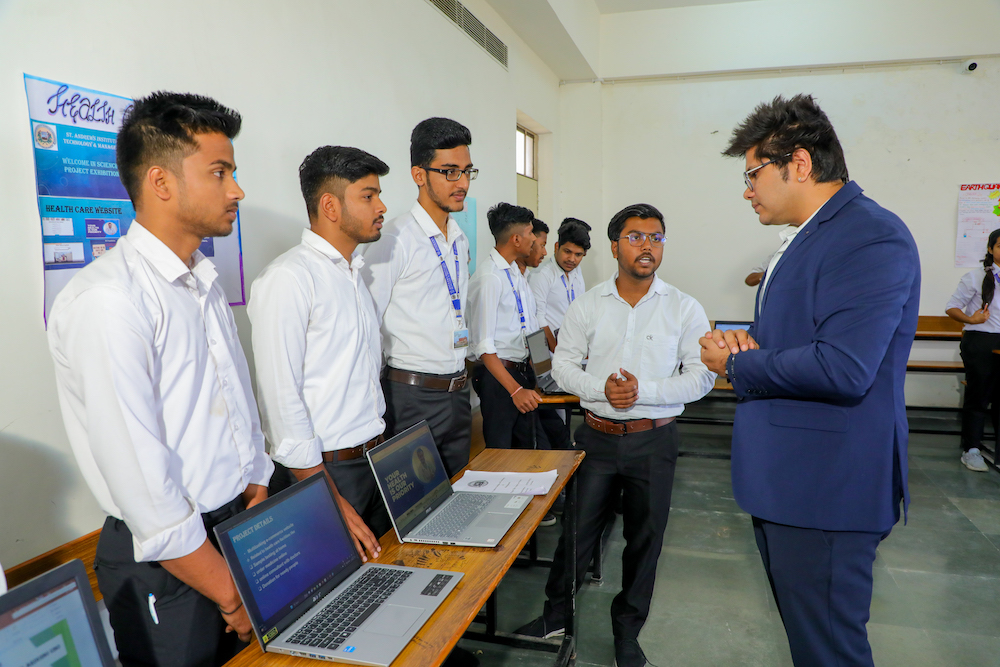
The admission process for a Bachelor of Technology (B.Tech) program involves several steps, from application to enrollment.
Here’s a detailed guide to the typical admission process:
Application Process
Research and Selection:
Research various colleges and universities that offer B.Tech programs.
Check their eligibility criteria, entrance exams accepted, specializations offered, and fee structure.
Application Form:
Fill out the application forms for the entrance exams (e.g., JEE Main, state-level exams) and for individual colleges if required.
Pay the application fees as specified.
Entrance Examinations;
National Level Exams:
JEE Main: Conducted by the National Testing Agency (NTA) for admission to NITs, IIITs, and other centrally funded institutions.
JEE Advanced: For candidates who qualify JEE Main, required for admission to IITs.
State Level Exams:
Examples include MHT CET (Maharashtra), WBJEE (West Bengal), KCET (Karnataka), EAMCET (Andhra Pradesh and Telangana), etc.
Institution-Specific Exams:
Examples include BITSAT (BITS Pilani), VITEEE (VIT University), SRMJEEE (SRM University), MET (Manipal Academy of Higher Education), etc.
Entrance Exam Preparation
Study Material:
Use recommended textbooks, study guides, and online resources.
Coaching Classes:
Consider enrolling in coaching classes if needed for structured preparation.
Practice Tests:
Take mock tests and practice previous years’ question papers.
Entrance Exam and Results
Examination:
Appear for the entrance exams on the scheduled dates.
Results:
Check the results and download the scorecards when they are announced.
Counseling and Seat Allotment
Counseling Registration:
Register for the counseling process conducted by the respective authorities (e.g., JoSAA for JEE Main and Advanced, state-level counseling bodies).
Choice Filling and Locking:
Fill in your preferred colleges and courses based on your entrance exam rank.
Lock your choices before the deadline.
Seat Allotment:
Seats are allotted based on rank, preferences, and availability.
Acceptance and Payment:
Accept the allotted seat and pay the seat acceptance fee if required.
Document Verification
Required Documents:
Entrance exam scorecard
10th and 12th grade mark sheets and certificates
Photo ID proof (e.g., Aadhar card, passport)
Category certificate (if applicable)
Domicile certificate (if applicable)
Passport-sized photographs
Medical fitness certificate (if required)
Verification:
Attend the document verification session as per the counseling schedule.
Submit photocopies of the documents along with the originals for verification.
Admission Confirmation
Fee Payment:
Pay the admission fee to confirm your seat in the allotted college.
Provisional Admission Letter:
Obtain the provisional admission letter after fee payment.
Reporting to the College
Reporting Date:
Report to the college on the specified date with all required documents.
Final Enrollment:
Complete any remaining formalities at the college, including filling out additional forms and getting your class schedule.
Orientation and Commencement of Classes
Orientation Program:
Attend the orientation program if the college organizes one for new students.
Classes Begin:
Start attending classes as per the academic calendar.
Top B Tech Specialisations
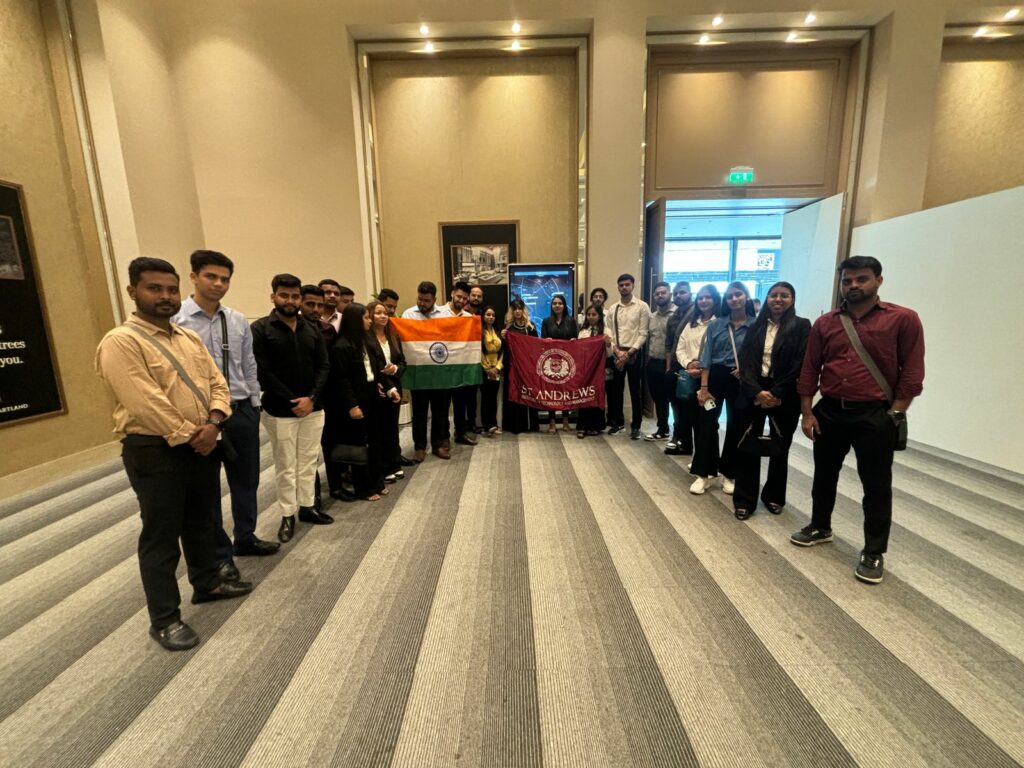
Bachelor of Technology (B.Tech) programs offer a wide range of specializations, each focusing on different aspects of technology and engineering.
Here’s a detailed overview of some of the top B.Tech specializations:
Computer Science and Engineering (CSE)
Focus: Design, development, and management of computer systems and software.
Core Subjects: Data Structures, Algorithms, Operating Systems, Database Management Systems, Computer Networks, Software Engineering, Artificial Intelligence, Machine Learning.
Career Opportunities: Software Developer, Systems Analyst, Network Administrator, Data Scientist, AI Engineer, Cybersecurity Specialist.
Industries: IT services, software development, finance, telecommunications, e-commerce.
Information Technology (IT)
Focus: Application of computer systems and telecommunications to store, retrieve, and send data.
Core Subjects: Programming, Web Technologies, Information Systems, Network Security, Database Management, Cloud Computing, Internet of Things (IoT).
Career Opportunities: IT Consultant, Web Developer, Systems Analyst, Network Engineer, IT Manager.
Industries: IT services, tech startups, consulting firms, financial institutions.
Electronics and Communication Engineering (ECE)
Focus: Design and development of electronic circuits, communication systems, and devices.
Core Subjects: Analog and Digital Electronics, Communication Systems, Microprocessors, VLSI Design, Signal Processing, Embedded Systems.
Career Opportunities: Electronics Engineer, Communication Engineer, VLSI Design Engineer, Embedded Systems Developer.
Industries: Telecommunications, consumer electronics, defense, automotive, aerospace.
Electronics Engineering (EE)
Focus: Generation, transmission, and distribution of electrical power and electronic systems.
Core Subjects: Circuit Theory, Electrical Machines, Power Systems, Control Systems, Electronics, Electrical Measurements.
Career Opportunities: Electrical Engineer, Power Systems Engineer, Control Systems Engineer, Electrical Maintenance Engineer.
Industries: Power generation and distribution, manufacturing, construction, renewable energy.
Mechanical Engineering (ME)
Focus: Design, analysis, manufacturing, and maintenance of mechanical systems.
Core Subjects: Thermodynamics, Fluid Mechanics, Machine Design, Manufacturing Processes, Heat Transfer, Robotics.
Career Opportunities: Mechanical Engineer, Design Engineer, Production Engineer, Automotive Engineer, Robotics Engineer.
Industries: Automotive, aerospace, energy, manufacturing, defense.
Civil Engineering (CE)
Focus: Design, construction, and maintenance of infrastructure such as buildings, roads, bridges, and water supply systems.
Core Subjects: Structural Analysis, Geotechnical Engineering, Hydraulics, Construction Management, Transportation Engineering.
Career Opportunities: Civil Engineer, Structural Engineer, Construction Manager, Urban Planner.
Industries: Construction, infrastructure development, urban planning, government agencies.
Chemical Engineering (ChE)
Focus: Design and operation of chemical processes for manufacturing and producing chemicals, pharmaceuticals, and materials.
Core Subjects: Chemical Reaction Engineering, Process Dynamics, Thermodynamics, Transport Phenomena, Biochemical Engineering.
Career Opportunities: Chemical Engineer, Process Engineer, Production Manager, Research Scientist.
Industries: Chemical manufacturing, pharmaceuticals, petrochemicals, food processing.
Aeronautical Engineering
Focus: Design, development, and maintenance of aircraft and spacecraft.
Core Subjects: Fluid Mechanics, Aerospace Propulsion, Aircraft Structures, Flight Mechanics, Avionics.
Career Opportunities: Aerospace Engineer, Aircraft Maintenance Engineer, Flight Test Engineer, Aerospace Systems Engineer.
Industries: Aerospace, defense, aviation, space exploration.
Biotechnology:
Focus: Application of biological systems and organisms in technology and product development.
Core Subjects: Genetic Engineering, Biochemical Engineering, Microbiology, Bioinformatics, Molecular Biology.
Career Opportunities: Biotechnologist, Research Scientist, Bioinformatics Specialist, Pharmaceutical Analyst.
Industries: Pharmaceuticals, agriculture, healthcare, environmental science.
Artificial Intelligence (AI)
Focus: Development of intelligent systems and applications that mimic human cognition and behavior.
Core Subjects: Machine Learning, Deep Learning, Natural Language Processing, Computer Vision, Robotics.
Career Opportunities: AI Engineer, Machine Learning Engineer, Data Scientist, Research Scientist.
Industries: Technology, healthcare, finance, autonomous vehicles, robotics.
Data Science
Focus: Extraction, analysis, and interpretation of complex data to support decision-making and strategic planning.
Core Subjects: Statistics, Data Mining, Big Data Technologies, Data Visualization, Predictive Analytics.
Career Opportunities: Data Scientist, Data Analyst, Business Intelligence Analyst, Data Engineer.
Industries: Technology, finance, healthcare, marketing, e-commerce.
Environmental Engineering:
Focus: Application of engineering principles to improve and maintain the environment for the health and safety of humans.
Core Subjects: Environmental Impact Assessment, Water and Wastewater Treatment, Air Pollution Control, Sustainable Development.
Career Opportunities: Environmental Engineer, Pollution Control Specialist, Sustainability Consultant.
Industries: Environmental consulting, government agencies, non-profits, industrial sectors.
Scholarships and Financial Aid for BTech Students

1. Government Scholarships
a. Central Sector Scheme of Scholarships for College and University Students
- Eligibility: Top 20th percentile of successful candidates in Class XII.
- Amount: ₹10,000 per year for the first three years and ₹20,000 per year in the fourth and fifth years.
b. Prime Minister’s Scholarship Scheme (PMSS)
- Eligibility: Dependent wards of ex-servicemen, ex-coast guard personnel, and police personnel.
- Amount: ₹2,500 per month for boys and ₹3,000 per month for girls.
c. AICTE Pragati Scholarship for Girls
- Eligibility: Female students admitted to the first year of a diploma/degree program in an AICTE-approved institution.
- Amount: ₹50,000 per annum.
d. AICTE Saksham Scholarship Scheme
- Eligibility: Differently-abled students pursuing a technical degree/diploma course.
- Amount: ₹50,000 per annum.
2. Institutional Scholarships
a. IITs and NITs Scholarships
- Eligibility: Merit-based and need-based scholarships for BTech students.
- Examples: Merit-cum-Means Scholarship, Institute Free Studentship, SC/ST Scholarships.
b. BITS Pilani Merit Scholarships
- Eligibility: Based on the academic performance of students.
- Amount: Partial tuition fee waiver.
c. St. Andrews Institute of Technology and Management Scholarships
- Eligibility: Based on academic performance, and need-based criteria.
- Amount: Varies, often covering a percentage of tuition fees.
3. Private Scholarships
a. L&T Build India Scholarship
- Eligibility: Final year engineering students.
- Amount: Tuition fee coverage and monthly stipend.
b. Reliance Foundation Scholarships
- Eligibility: Meritorious students from low-income families.
- Amount: Up to 100% of tuition fees.
c. Aditya Birla Group Scholarships
- Eligibility: Top-ranking students from select engineering institutions.
- Amount: ₹1,00,000 per annum.
4. State Government Scholarships
a. Maharashtra Government Scholarships
- Eligibility: Students from Maharashtra with a good academic record.
- Amount: Varies by scheme, often includes tuition fee waivers and maintenance allowances.
b. Karnataka Government Scholarships
- Eligibility: Residents of Karnataka meeting specific academic and financial criteria.
- Amount: Covers tuition fees and provides maintenance allowances.
5. Industry-Sponsored Scholarships
a. Google Scholarship for Women in Tech
- Eligibility: Female students in computer science and related fields.
- Amount: Financial support and a retreat at Google.
b. IBM Scholarship
- Eligibility: Students with strong academic performance in computer science and engineering.
- Amount: Financial assistance and potential internship opportunities.
6. Financial Aid
a. Education Loans
- Providers: Nationalized banks, private banks, and NBFCs.
- Interest Rate: 8% to 15% per annum.
- Repayment: Starts after the completion of the course with a moratorium period of 6 months to 1 year.
b. Fee Waivers and Concessions
- Eligibility: Economically weaker sections (EWS) and other deserving candidates.
- Institutions: Many private and government colleges offer partial to full fee waivers.
BTech Fees at Top Private Engineering Colleges
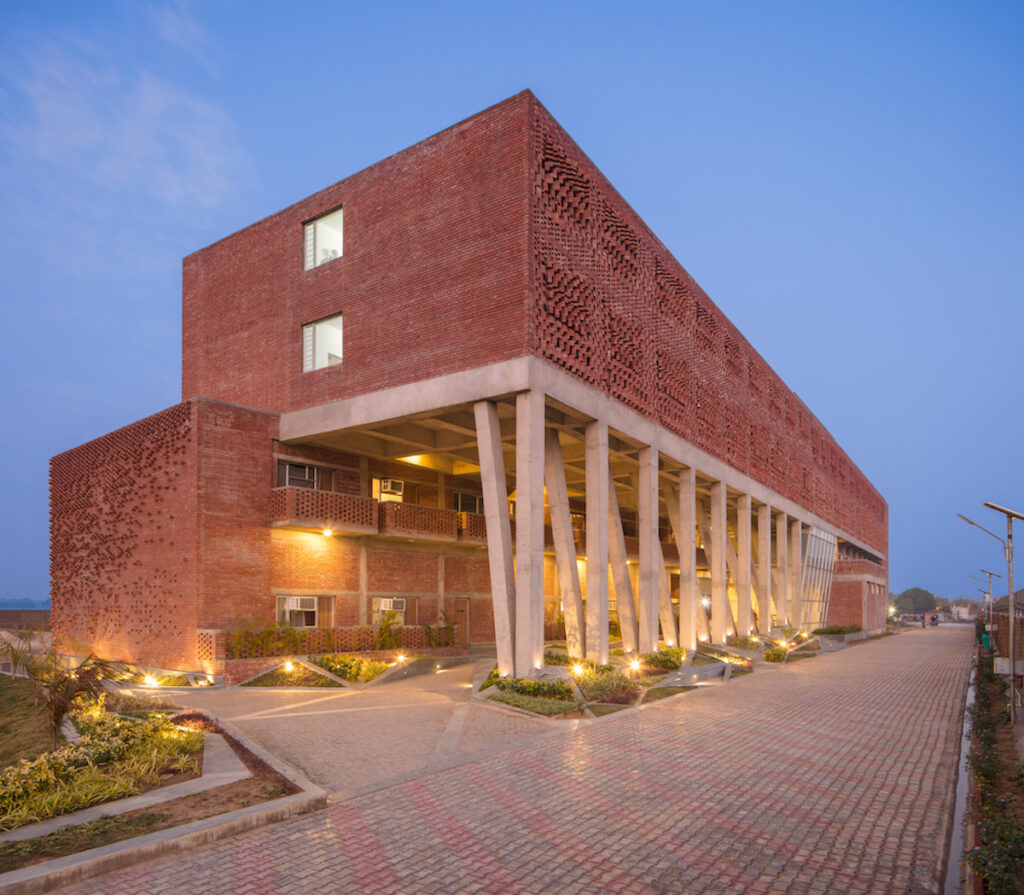
Here’s the revised fee structure for B Tech programs at some of the top private engineering colleges in India:
St. Andrews Institute of Technology and Management (SAITM), Gurgaon:
BTech Fees: ₹98,500 per year.
VIT University, Vellore:
BTech Fees: Approximately ₹2-3 lakhs per year.
Shiv Nadar University, Greater Noida:
BTech Fees: Around ₹2-2.5 lakhs per year.
Amrita Vishwa Vidyapeetham, Coimbatore:
BTech Fees: Approximately ₹1.5-2.5 lakhs per year.
BITS Pilani:
BTech Fees: Approximately ₹4-5 lakhs per year.
Ashoka University, Sonepat:
BTech Fees: Around ₹3-4 lakhs per year.
Great Lakes Institute of Management, Gurgaon:
BTech Fees: Around ₹1.5-2 lakhs per year.
BTech Fees at Top Government Engineering Colleges
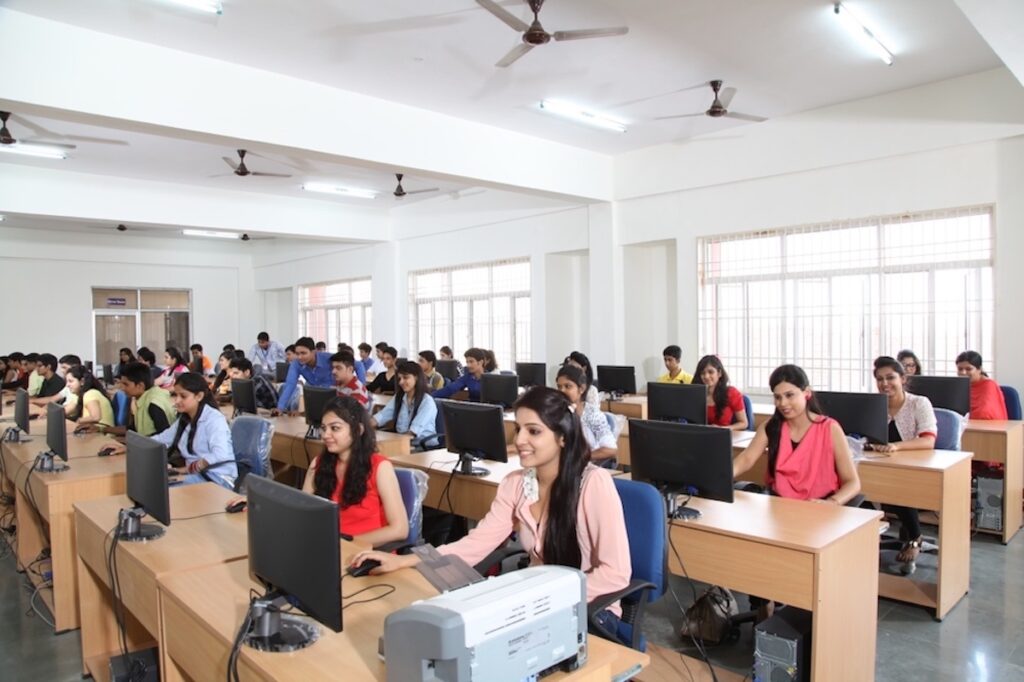
B Tech fees at top government engineering colleges in India are generally more affordable compared to those at private institutions.
Here’s a general idea of the fee range at some prominent government engineering colleges:
Indian Institute of Technology (IITs) like IIT Delhi, IIT Bombay :
BTech Fees: Approximately ₹2.5-3 lakhs per year.
St. Andrews Institute of Technology and Management (SAITM), Gurgaon
BTech Fees: ₹98,500 per year.
National Institute of Technology (NITs):
B Tech Fees: Around ₹1-1.5 lakhs per year.
Delhi Technological University (DTU):
B Tech Fees: Approximately ₹1-1.5 lakhs per year.
Jawaharlal Nehru Technological University (JNTU), Hyderabad:
B Tech Fees: Around ₹1-1.5 lakhs per year.
Detailed Fee Structure for B Tech Specializations
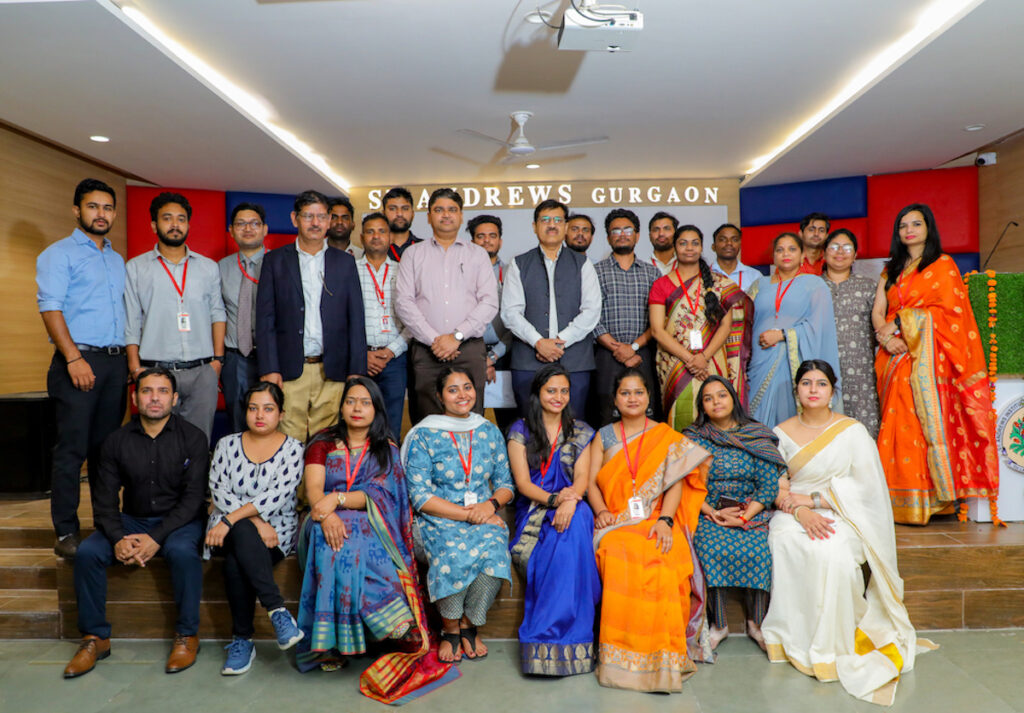
B Tech fees can vary depending on the specialization and the institution offering the program.
Here’s a general overview of the fee structures for various B Tech specializations at top engineering colleges in India:
Computer Science Engineering (CSE)
Top Private College: ₹1.5-5 lakhs per year
Top Government College: ₹1-3 lakhs per year
Electrical Engineering
Top Private College: ₹1.5-4 lakhs per year
Top Government College: ₹1-2 lakhs per year
Mechanical Engineering
Top Private College: ₹1.5-4 lakhs per year
Top Government College: ₹1-2 lakhs per year
Civil Engineering
Top Private College: ₹1.5-4 lakhs per year
Top Government College: ₹1-2 lakhs per year
Electronics and Communication Engineering
Top Private College: ₹1.5-4 lakhs per year
Top Government College: ₹1-2 lakhs per year
Chemical Engineering
Top Private College: ₹1.5-4 lakhs per year
Top Government College: ₹1-2 lakhs per year
Information Technology
Top Private College: ₹1.5-4 lakhs per year
Top Government College: ₹1-2 lakhs per year
Biotechnology;
Top Private College: ₹1.5-4 lakhs per year
Top Government College: ₹1-2 lakhs per year
Aerospace Engineering
Top Private College: ₹1.5-5 lakhs per year
Top Government College: ₹1-2 lakhs per year
Environmental Engineering
Top Private College: ₹1.5-4 lakhs per year
Top Government College: ₹1-2 lakhs per year
Production Engineering
Top Private College: ₹1.5-4 lakhs per year
Top Government College: ₹1-2 lakhs per year
Structural Engineering
Top Private College: ₹1.5-4 lakhs per year
Top Government College: ₹1-2 lakhs per year
Trends in BTech Course Fees
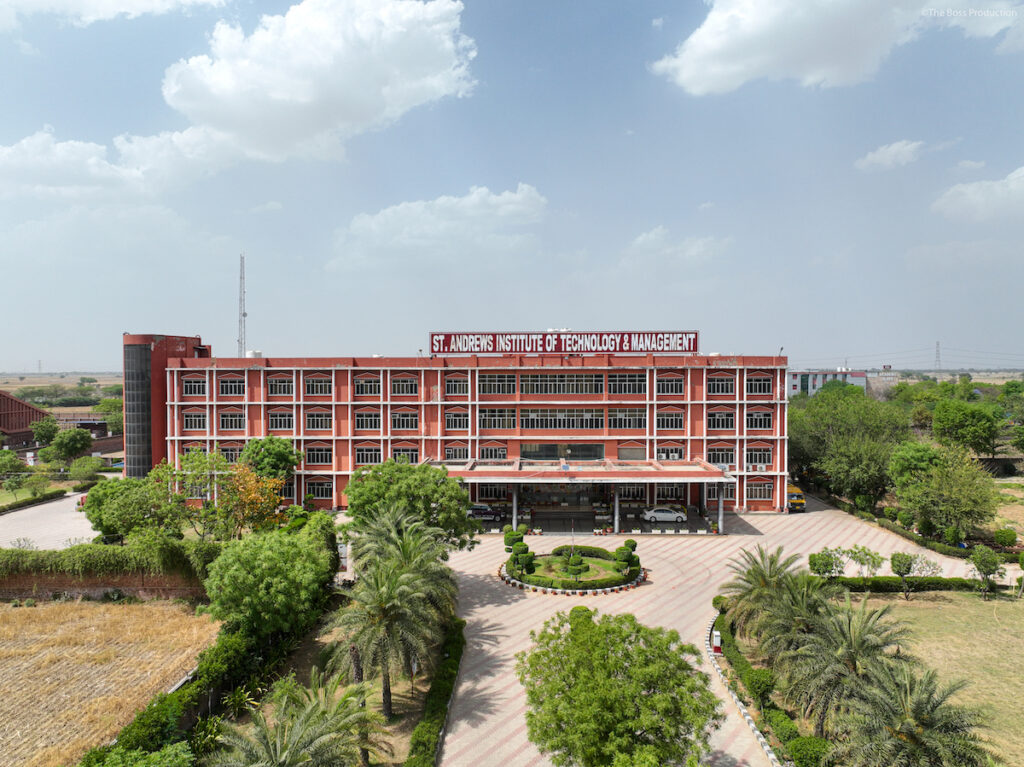
Annual Fee Increases
- General Trend: BTech course fees have been increasing annually, often due to inflation, enhanced facilities, and improved infrastructure.
- Example: Annual fee hikes of 5-10% are common across many institutions.
Differentiation by Institution Type
- Government Institutions: Generally lower fees compared to private institutions. Subsidized by the government.
- Private Institutions: Higher fees reflecting market-driven rates and additional amenities.
- Deemed Universities: Often have fee structures similar to private institutions but can offer more flexibility in course structures and specializations.
Impact of Location
- Urban vs. Rural: Institutions in metropolitan areas tend to charge higher fees compared to those in rural areas due to higher operational costs.
- State Variation: Fee structures vary significantly from state to state depending on local policies and economic conditions.
Course Specializations
- Standard Specializations: Core branches like Computer Science, Mechanical, and Civil Engineering usually have consistent fee structures.
- Emerging Fields: Specializations in Artificial Intelligence, Data Science, and Cybersecurity often have higher fees due to the demand and resource requirements.
Tier-based Differentiation
- Top-tier Institutions: IITs, NITs, and premier private institutions charge premium fees reflecting their brand value, placement records, and research opportunities.
- Mid-tier and Lower-tier Institutions: More affordable but with varying quality of education and infrastructure.
Introduction of New Fee Components
- Technology Fees: Additional charges for digital resources, online libraries, and learning management systems.
- Research and Development Fees: Fees allocated for supporting student research projects and innovation hubs.
Financial Assistance and Scholarships
- Increased Availability: More scholarships and financial aid options are becoming available, both merit-based and need-based, to help manage rising costs.
- Institution-specific Aid: Many institutions are setting up their own scholarship funds to attract talented students.
Economic Impact
- COVID-19 Pandemic: The pandemic led to a temporary freeze or reduction in fee hikes in some institutions, while others adjusted their fees to accommodate online learning.
- Economic Downturns: In times of economic stress, there may be more pressure on institutions to limit fee increases and offer more financial support.
Tips for Managing BTech Course Fees
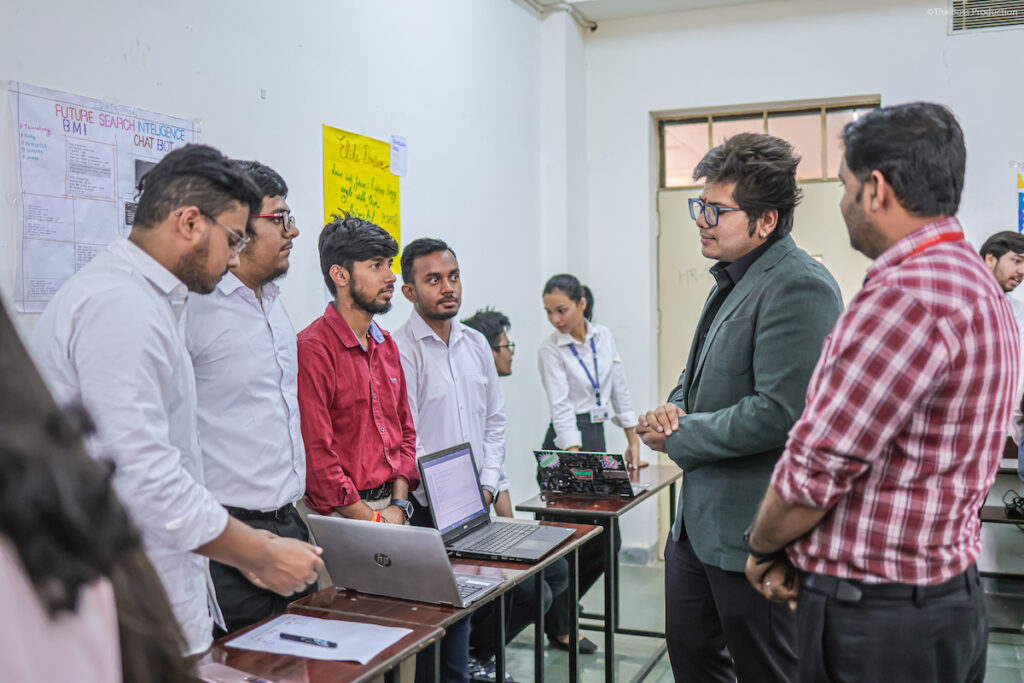
Managing the costs associated with a BTech degree requires careful planning and resourcefulness.
Here are some practical tips to help manage and potentially reduce the financial burden:
Apply for Scholarships and Grants
- Research Opportunities: Look for government, institutional, and private scholarships.
- Timely Application: Apply early and ensure all required documents are submitted.
- Diverse Applications: Apply for multiple scholarships to increase your chances.
Consider Education Loans
- Government Schemes: Look into student loan schemes offered by nationalized banks with lower interest rates and flexible repayment terms.
- Private Lenders: Compare loans from private banks and NBFCs for better terms if government loans aren’t sufficient.
- Interest Subsidies: Check for interest subsidies or moratorium periods offered by some lenders during the study period.
Work-Study Programs
- On-Campus Jobs: Explore part-time jobs within the campus, such as library assistant, lab assistant, or teaching assistant roles.
- Internships: Seek paid internships related to your field of study which can also provide valuable experience.
Optimize Living Expenses
- Hostel vs. Off-Campus Housing: Compare costs between on-campus hostels and off-campus accommodations.
- Sharing Costs: Share accommodation with other students to reduce rent and utility expenses.
- Meal Plans: Opt for campus meal plans or cook your own meals to save on food expenses.
Leverage Free Resources
- Library Access: Use the college library for textbooks and study materials instead of buying new ones.
- Online Resources: Utilize free online courses, lectures, and open educational resources (OERs) for supplementary learning.
Plan and Budget
- Monthly Budget: Create a monthly budget for expenses, including fees, accommodation, food, transportation, and personal expenses.
- Track Spending: Regularly track your spending to avoid unnecessary expenses and adjust your budget accordingly.
Consider Community and State Colleges
- Initial Years: Complete the first one or two years at a community or state college where fees might be lower, then transfer to a higher-tier institution.
- Local Options: Attend a college in your state or community to save on out-of-state or relocation expenses.
Explore Fee Waivers and Discounts
- Early Payment Discounts: Some institutions offer discounts for early payment of fees.
- Sibling Discounts: Check if the college offers discounts for students with siblings studying at the same institution.
- Need-Based Waivers: Apply for fee waivers if your family income falls below a certain threshold.
Negotiate Payment Plans
- Installments: Request the institution to break down the fee payment into manageable installments.
- Deferred Payments: Inquire about deferred payment options where part of the fee can be paid after securing a job post-graduation.
Utilize Tax Benefits
- Section 80E of Income Tax Act: Avail tax deductions on the interest paid on education loans.
- Tax-Free Scholarships: Ensure scholarships received are structured in a tax-free manner.
Hidden Costs in BTech Programs
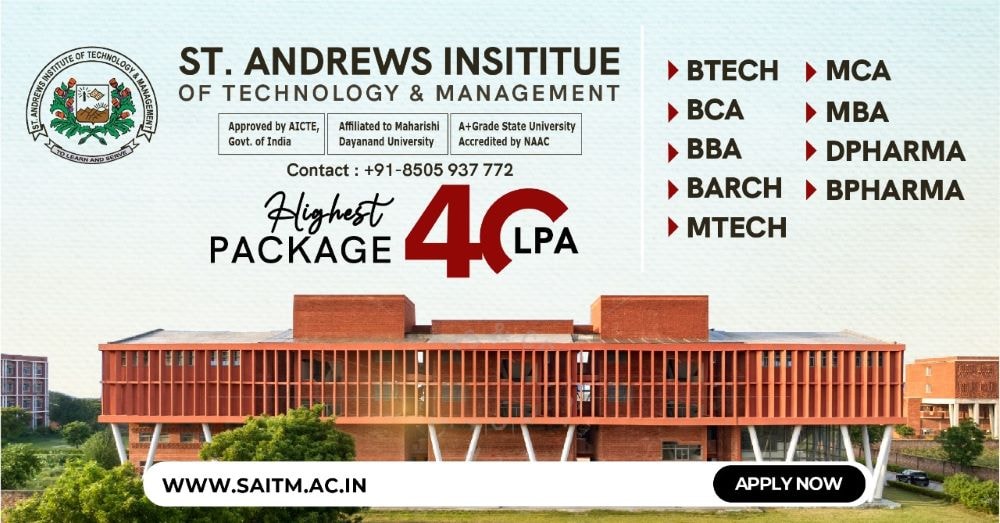
When considering a BTech program, it’s important to be aware of potential hidden costs beyond tuition fees.
Here are some common hidden costs associated with BTech programs:
Laboratory and Equipment Fees
- Lab Fees: Usage of specialized laboratories may incur additional fees.
- Equipment: Personal equipment like laptops, software, and tools may be required.
Study Materials
- Textbooks: Required textbooks and reference materials can be expensive.
- Online Resources: Subscription fees for online resources and journals.
Project and Research Expenses
- Project Materials: Costs for materials needed for final year projects.
- Printing and Binding: Costs for printing and binding reports and theses.
Examination and Certification Fees
- Examination Fees: Fees for taking exams, including supplementary exams.
- Certification Courses: Fees for additional certifications or specialized courses.
Accommodation and Living Expenses
- Hostel Fees: Costs for on-campus housing, which may include utilities.
- Off-Campus Housing: Rent, utilities, and other living expenses if staying off-campus.
Transportation
- Commuting: Costs for daily commuting if living off-campus.
- Field Trips: Expenses for mandatory field trips and industrial visits.
Extracurricular Activities
- Club Memberships: Fees for joining academic or extracurricular clubs.
- Events and Competitions: Costs associated with participating in competitions, seminars, and workshops.
Internships and Placements
- Internship Expenses: Travel and accommodation costs for internships.
- Placement Preparations: Costs for attending placement workshops, buying formal attire, etc.
Medical and Insurance
- Insurance: Health insurance premiums, if not included in the tuition fee.
- Expenses: Out-of-pocket expenses for medical treatments and consultations.
Miscellaneous
- Campus Services: Fees for using campus facilities like gyms, swimming pools, and recreational centers.
- Technology Fees: Charges for campus internet, printing, and other IT services.
Top Government B Tech Colleges in India
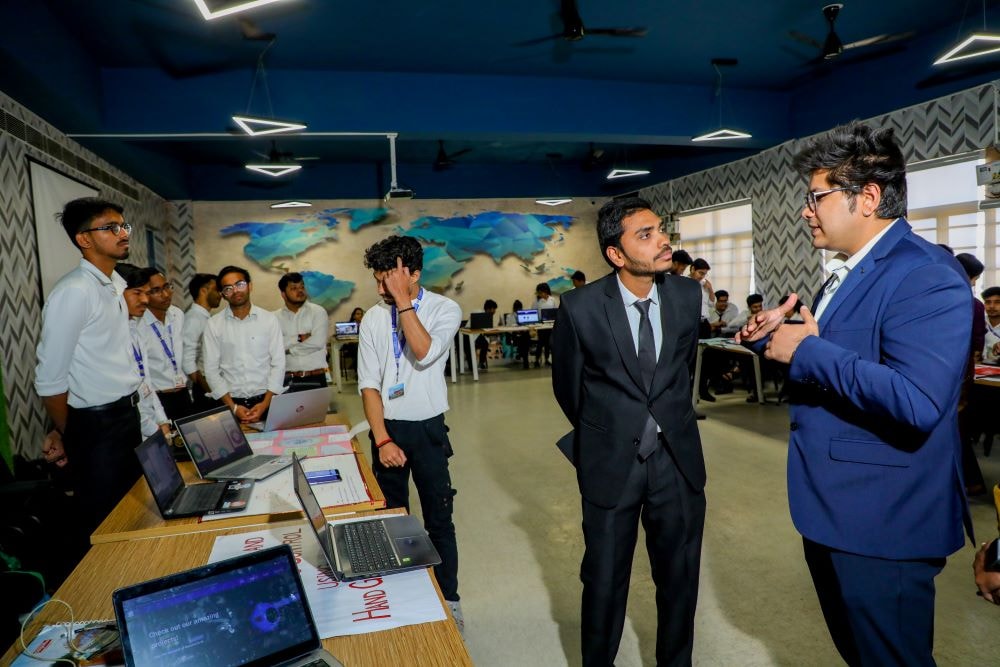
Here are some of the top government BTech colleges in India:
Indian Institute of Technology (IITs)
Location: Mumbai, Delhi, Kanpur, Madras, Kharagpur
Highlights: Renowned for its research facilities, faculty, and global ranking.
St. Andrews Institute of Technology and Management (SAITM), Gurgaon;
Location: Gurgaon, Haryana
Highlights: Offers a range of B.Tech programs with a focus on industry-oriented education and practical experience.
National Institute of Technology (NIT) Trichy
Location: Tiruchirappalli, Warangal
Highlights: Known for its engineering programs and strong placement records.
Institute of Chemical Technology (ICT) Mumbai
Location: Mumbai, Maharashtra
Highlights: Specializes in chemical engineering and has a strong reputation in the field.
Delhi Technological University (DTU)
Location: New Delhi
Highlights: Offers a range of engineering programs with strong industry links.
Jawaharlal Nehru Technological University (JNTU) Hyderabad
Location: Hyderabad, Telangana
Highlights: Known for its comprehensive engineering programs and research.
Birla Institute of Technology (BIT) Mesra
Location: Mesra, Jharkhand
Highlights: Offers a range of engineering courses and has a strong industry connection.
Punjab Engineering College (PEC) Chandigarh
Location: Chandigarh
Highlights: Known for its engineering programs and research contributions.
Top Private B Tech Colleges in India

Here are some of the top private BTech colleges in India:
Shiv Nadar University
Location: Greater Noida, Uttar Pradesh
Highlights: Known for its strong emphasis on research and high-quality faculty.
St. Andrews Institute of Technology and Management {SAITM}, Gurgaon
Location: Gurgaon, Haryana
Highlights: Offers a range of B.Tech programs with a focus on industry-oriented education and practical experience.
Birla Institute of Technology and Science (BITS) Pilani
Location: Pilani, Rajasthan
Highlights: Renowned for its innovative curriculum and strong industry connections.
Vellore Institute of Technology (VIT)
Location: Vellore, Tamil Nadu
Highlights: Known for its high academic standards and large campus with modern facilities.
Thapar Institute of Engineering and Technology
Location: Patiala, Punjab
Highlights: Known for its strong academic curriculum and research initiatives.
Jaipuria Institute of Management
Location: Jaipur, Rajasthan
Highlights: Offers engineering programs with a focus on management and leadership skills.
PES University
Location: Bangalore, Karnataka
Highlights: Offers a range of engineering programs with a focus on research and industry collaboration.
Job Profiles Offered to B Tech Graduates
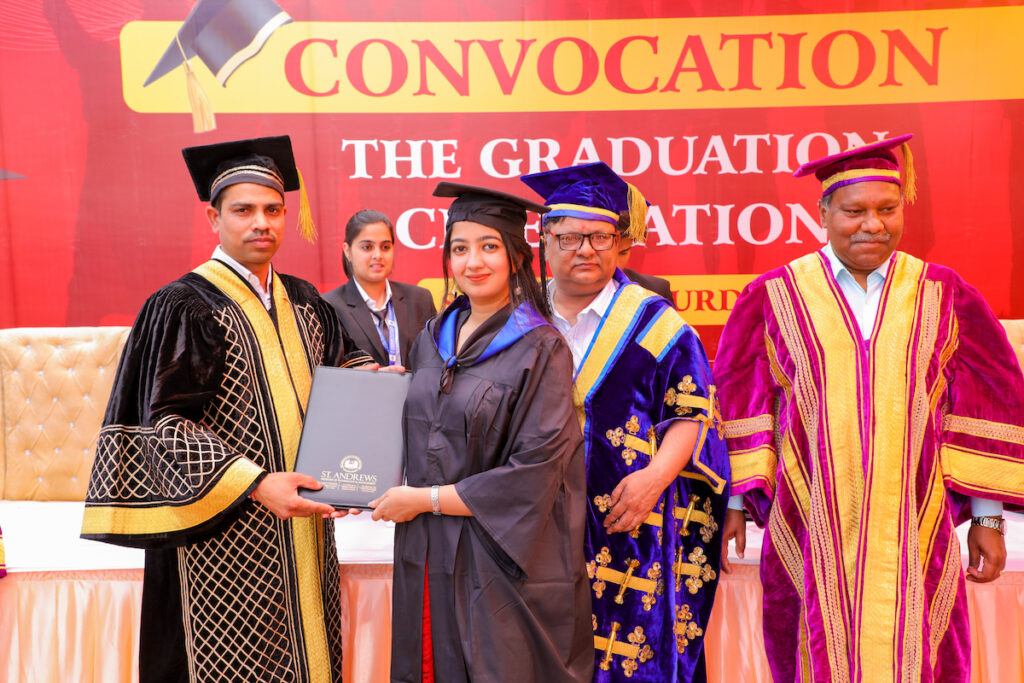
BTech programme graduates have a wide range of job profiles available to them, depending on their specialization and interests.
Here are some common job profiles offered to BTech graduates:
Software Engineer/Developer
Role: Design, develop, test, and maintain software applications or systems.
Industries: Technology, finance, healthcare, entertainment.
Data Scientist/Analyst
Role: Analyze and interpret complex data to help organizations make informed decisions.
Industries: Technology, finance, healthcare, e-commerce.
Network Engineer
Role: Design, implement, and manage network systems to ensure smooth and efficient connectivity.
Industries: Telecommunications, technology, finance, healthcare.
Systems Analyst
Role: Analyze and design information systems to meet business needs and improve efficiency.
Industries: Technology, finance, consulting, healthcare.
Cybersecurity Analyst
Role: Protect an organization’s systems and networks from cyber threats and attacks.
Industries: Technology, finance, government, healthcare.
Embedded Systems Engineer
Role: Design and develop embedded systems used in various electronic devices.
Industries: Automotive, consumer electronics, telecommunications, aerospace.
Mechanical Engineer
Role: Design, develop, and maintain mechanical systems and components.
Industries: Manufacturing, automotive, aerospace, energy.
Electrical Engineer
Role: Design, develop, and maintain electrical systems and components.
Industries: Energy, telecommunications, manufacturing, utilities.
Civil Engineer
Role: Plan, design, and oversee construction and maintenance of infrastructure projects.
Industries: Construction, real estate, government, transportation.
Chemical Engineer
Role: Design and manage processes for large-scale production of chemicals, pharmaceuticals, and other products.
Industries: Chemicals, pharmaceuticals, food and beverage, petrochemicals.
Database Administrator
Role: Manage and maintain databases to ensure their performance, security, and reliability.
Industries: Technology, finance, healthcare, e-commerce.
Top Recruiters for BTech Degree Graduates

Top recruiters for BTech graduates span various industries, reflecting the diverse career opportunities available in technology, engineering, and related fields.
Here are some of the prominent recruiters:
Technology and IT Companies:
Microsoft
Amazon
Apple
IBM
Oracle
Intel
Cisco Systems
SAP
Hewlett Packard Enterprise (HPE)
Consulting Firms:
Accenture
Deloitte
Ernst & Young (EY)
KPMG
PricewaterhouseCoopers (PwC)
McKinsey & Company
Boston Consulting Group (BCG)
Capgemini
Financial Services and Banks:
Goldman Sachs
JPMorgan Chase
Morgan Stanley
Barclays
Citi
HSBC
Bank of America
Deutsche Bank
Engineering and Manufacturing Companies:
General Electric (GE)
Siemens
Bosch
Honeywell
Schneider Electric
Caterpillar
L&T (Larsen & Toubro)
Telecommunications Companies:
AT&T
Verizon
Huawei
Ericsson
Nokia
E-commerce and Internet Companies:
Flipkart
Paytm
Snapdeal
Alibaba
eBay
Research and Development Firms:
Bell Labs
Xerox PARC
IBM Research
FAQs
What is the typical fee structure for a BTech program?
The B Tech fees structure usually encompasses tuition, registration, lab, and examination fees, along with additional charges like hostel and mess fees. The total cost can vary significantly depending on the institution, location, and chosen course specialization.
Are BTech fees the same for all institutions?
No, B Tech fees vary widely depending on the institution. Government colleges generally have lower fees compared to private institutions. Additionally, fees can differ based on the institution’s location, reputation, and facilities provided.
Can BTech fees be paid in installments?
Many institutions allow the payment of B Tech fees in installments, including options to pay per semester or annually. It’s advisable to consult the specific institution for details on their fee payment policies.
Are there any scholarships available to cover BTech degree fees?
Yes, many institutions and external organizations offer scholarships and financial aid to help cover B Tech fees. These scholarships may be based on merit, financial need, or specific criteria such as academic performance or extracurricular achievements.
What additional costs should I consider apart from the tuition fee?
In addition to tuition fees, students should consider other costs such as hostel fees, mess charges, lab fees, examination fees, books and materials, and any extracurricular activity fees.
Can I get a fee waiver or reduction?
Fee waivers or reductions may be available based on merit, financial need, or special circumstances. Some institutions also offer fee concessions for students from economically weaker sections or underprivileged backgrounds.
Are there any hidden charges in the BTech courses fee structure?
Some institutions might have additional or hidden charges such as for extra-curricular activities, transport, and campus maintenance. It’s important to review the fee structure in detail and ask the institution about any additional costs.
How often are B Tech degree fees revised?
BTech fees can be revised periodically, typically on an annual basis. Fee revisions can be influenced by factors such as inflation, changes in government policies, or institutional upgrades. Always check for any notifications regarding fee revisions.
What is the refund policy for BTech courses fees?
The refund policy for B Tech fees differs from one institution to another. Typically, schools may provide partial refunds if a student withdraws by a specific deadline. It’s crucial to familiarize yourself with the refund policies and deadlines prior to enrollment.
Are there any financial aid options for international students pursuing BTech?
Yes, international students often have access to scholarships, grants, and financial aid specifically designed to assist with studying abroad. Many institutions and external organizations provide financial support to help cover B Tech fees and other related expenses for international students.
Is Petroleum Engineering good course?
Petroleum Engineering is a specialized branch that centers on the exploration, extraction, production, and management of oil and gas resources. It applies engineering principles and technologies to ensure efficient and safe extraction of petroleum and natural gas, with B Tech fees varying by program and institution.
How do I find out about the fee structure of a specific institution?
To learn about the B Tech fees at a specific institution, it’s best to check the official website or contact the admissions office directly. They can offer comprehensive details on tuition, additional costs, and potential financial aid opportunities.


